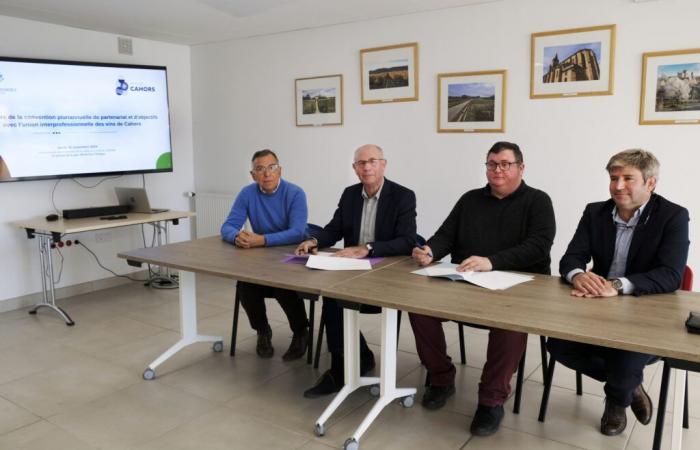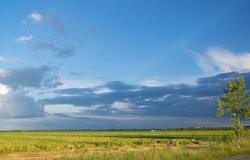Partnership agreement between the Community of Communes and the UIVC.
As early as April, the day after the frost which destroyed a large part of the vineyard, the Community of Communes of the Lot and Vineyard Valley (CCVLV) expressed the wish to come to the aid of wine growers via the Interprofessional Union of Cahors Wines (UIVC). The approach was made possible thanks to the Call for Expressions of Interest (AMI) that the Occitanie Region set up in July. By October, the MAI was signed. This is how the elected representatives of the CCVLV were able to meet on November 28 with the co-presidents of the UIVC at their premises in Puy-l'Évêque for the signing of the multi-year agreement on partnership and objectives. in order to provide aid of 150,000 euros in 2024, renewable twice.
Present around the table were Serge Bladinières, president of the CCVLV, Gérard Alazard, elected in charge of economic development, Cédric Tannière and Sébastien Sigaud, co-presidents of the UIVC.
Serge Bladinières began by thanking the people who made this convention possible in such a short time, Laurent Magot for the UIVC and Laurent Hernandez for the CCVLV, as well as all the elected officials who voted for it at the unanimity. He recalled that today, 750 hectares of vines are being uprooted, which demonstrates the deep crisis it is going through. Although the CCVLV represents only 27 municipalities, 3/4 of the Cahors vineyards are located on its territory: solidarity with the winegrowers was therefore obvious. The CCVLV undertakes to pay 150,000 euros per year over the 3 financial years from 2024: the effort that elected officials have made on viticulture is not made with budgetary ease, but with economic choices on other positions which will be taken in 2025 and perhaps a slight increase in taxation, as low as possible. Gérard Alazard recalled that the CCVLV has always been alongside viticulture, which allows us to have a clear vision of the situation and to accelerate the help to be provided by moving in the right direction.
Cédric Tannière, representing the traders' branch, thanked the elected representatives of the CCVLV for having been the first to offer help to the UIVC, and that this example encouraged other structures to support them. This initiative is therefore a strong gesture for the profession. He returned to the creation of a real Malbec sector in Cahors which will manage both the AOC and the IGP: “It is the same territories, the same winegrowers who make these products. On the merchant side, we wanted there to be management of a wine industry across the entire Lot. This gives us the means to renew the Cahors Appellation, to enable businesses to develop, sustain and find new markets, particularly exports. » Sébastien Sigaud, representative of the producers, recalled that the discussion between producers and traders is permanent. This exchange led to this strong decision to bring together the wine-growing region: at 1is January 2025, the UIVC will become the Interprofessional Union of Cahors and Côtes du Lot Wines. In fact until 2017, the AOC represented around 90% of the vineyard. Today, a change has taken place because of the flow of wine towards an IGP Malbec Côtes-du-Lot. From now on, the Lot vineyards will be treated as a whole and skills will be pooled, for example for administration, communication and promotion.
The presidents of the UIVC recalled how the approach of the CCVLV as the first institution to have offered itself in 2024 to help the inter-profession is important and decisive, since it made it possible to obtain other support, in particular of Grand Cahors and the Community of Communes of Quercy Blanc, as well as the Call for Expressions of Interest (AMI) system of the Occitanie Region, which increases the aid to 850,000 euros over 3 years. This will finance the administrative restructuring of the UIVC, export promotion and diagnosis of the territory, with planes from March 2025 which will make it possible to see how the cold air is positioned in the valley. The fight against climatic hazards, whether frost or drought, will be done in the short, medium and long term with several types of technical solutions in order to adapt to each need: wind turbines, irrigation, sprinklers, heating wires, machines paraffin and smoke, smoke from hay bales… Everything will depend on the cartographic study of the territory. “And all of this is thanks to you, the CCVLV, because without your help, we wouldn’t even have been able to get started. From now on, if it is necessary to invest in a machine, with the help that you allow us to provide to winegrowers, this becomes possible, with the traders who support sales. It’s a real collaboration,” concluded Sébastien Sigaud.






